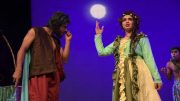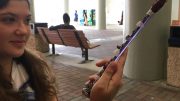Nadine Matas / Contributing writer
Shakespeare’s First Folio is being housed in the Frost Art Museum at the MMC campus for the rest of February.
The Program for Studies in Spirituality hosted a lecture last week Monday, Feb. 15, in the Frost Museum in honor of the Shakespeare’s Folio month festivities. The lecture titled “Shakespeare, Music and Love” was introduced by the Spirituality Director Erin Weston.
Weston spoke briefly on the Spirituality program at FIU, emphasizing how they have made the attempt to “explore traditional and contemporary spirituality, and host lectures for interdisciplinary studies.”
The program, according to their page and director, strive to promote the study of multi-faith and multi-spirituality studies for the students of the university.
The goal then, is to “get more students, regardless of their discipline, involved in the study of spirituality,” said Weston.
Laura Pomar, a junior studying physics, who attended the lecture, said, “I feel like there should be more events like this because it helped clarify the concept of romanticism to those who may not study literature.”
The lecture lasted about an hour and half and drew in an array of students from different disciplines, all with different purposes of being there.
“I am taking a class on this now, and they should have more presentations like this. I thought it was really good.” Gabriela Rodriguez, a junior studying history, said post-lecture.
This lecture specifically was headed by Peter Rogan who, as Weston introduced, is “a dramatic performer and speaker.”
He was accompanied by a duo of musicians, Karen Carlisle-Neal and Brian Neal, who performed as well as accompanied Rogan’s delivery of the Shakespearian monologues.
The lecturer’s purpose, in Rogan’s words, was “to see the connection between ourselves and nature better through Shakespeare.”
Rogan made sure to emphasize that “Shakespeare celebrated love in all his works” and that what he was presenting here was only a “small glimpse of how Elizabethans saw love.”
For this reason Rogan expressed that the lecture’s name was fitting, but was not the only name in mind. He stated it could also be called “Lovers, Villains and Fools” as well as “Finding, Recognizing and Appreciating the Spirituality of Shakespeare.”
“It was really refreshing because the Elizabethan era is sometimes viewed through such a narrow lens that it takes away from the depth of the art it produced,” Pomar said.
Rogan broke down this view of love by presenting concepts such as “the Great Chain of Being,” as well as the four elements that supposedly make up the world; air, fire, water, and earth.
According to Rogan, this “Great Chain of Being,” separates how everyone sees love and the different tiers of this emotion. His presentation touched upon the love for the other worldly, such as God and the angels, but mostly focused on humans and the different types of love that rule us.
“I am fire and air, the rest I leave behind,” Rogan quoted from Antony and Cleopatra, in an attempt to explain how the four elements tie into love.
Rogan states that “fire and air are the finer, more spiritual elements, while water and earth represent the more dense and material aspects of human beings and their love.”
All these concepts he attempted to present in an innovative manner, while still teaching a lesson on Elizabethan spirituality through Shakespearian portrayal of love.
The lecture presented soliloquies from “Henry III, Hamlet, Romeo and Juliet, Much Ado About Nothing,” among other plays from Shakespeare’s writing that most people would be familiar with. The end goal was to create a learning environment driven by the arts, according to both Weston and Rogan.
The combination of the lecture, music and performance merged together several disciplines in an attempt to promote not only the folio but the study in spirituality’s main objective, which is to reach more than just a small audience, as mentioned by Weston in the introduction. The program was seemingly popular among students, such as Pomar and Rodriguez, who expressed being taken in by the presentation and left wanting more.






Be the first to comment on "Lecture explores spirituality in Shakespeare"